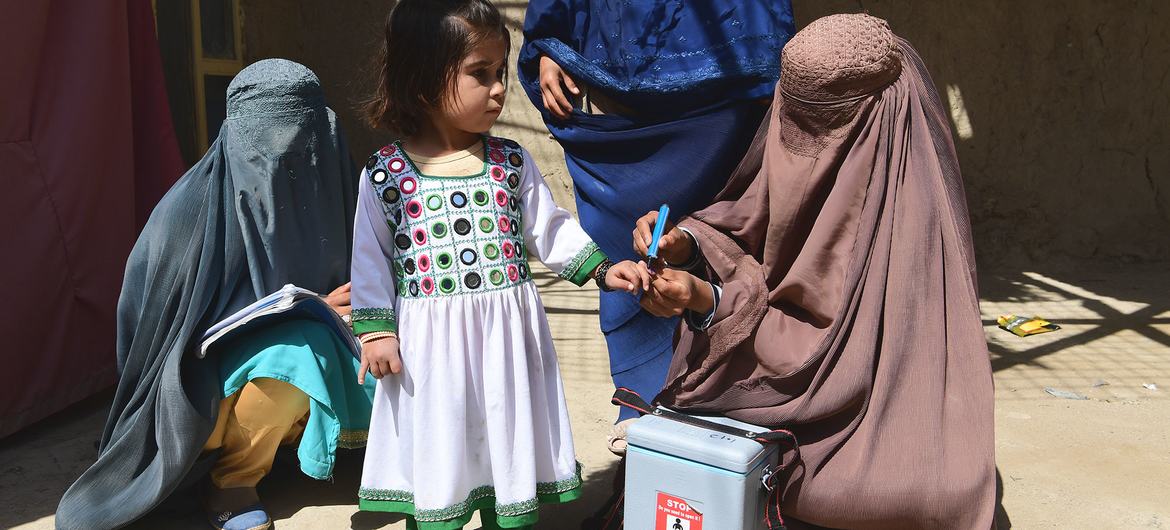
Taliban order bars Afghan women from working with UN
© UNICEF/Frank Dejongh A child is vaccinated against polio during a polio mobilization campaign in Kandahar, Afghanistan.
United Nations, 4 April 2023
Taliban authorities in Afghanistan have issued an order banning women nationals who are UN staff members from continuing to work, the UN spokesperson said on Tuesday.
“Our colleagues on the ground at the UN mission in Afghanistan (UNAMA) received word of an order by the de facto authorities that bans female national staff members of the UN from working,” Stéphane Dujarric, spokesperson for the UN Secretary-General, told reporters at UN Headquarters during the regular daily briefing.
“We are still looking into how this development would affect our operations in the country,” he said. “We expect to have more meetings with the de facto authorities tomorrow in Kabul, on which we are trying to seek some clarity.”
Following Afghanistan’s fall to the Taliban in August 2021, the UN remained committed to stay and deliver, while calling for unified support for the country’s people.
Despite relatively constructive initial engagements with Taliban authorities, decisions over the last year by the fundamentalist leadership have included bans on women accessing higher education, working for NGOs, and accessing many public spaces.
Ban ‘unacceptable’: Guterres
Answering questions from reporters, Mr. Dujarric said an official communication coming from the Taliban leadership, had indicated that the order would apply to the whole country.
“We hope we will hear strong voices from the Security Council,” he said, noting that the UN mission operates under its mandate.
For the Secretary-General, any such ban would be unacceptable and “frankly inconceivable”, Mr. Dujarric said.
Female staff ‘essential’
The reported decision focussed on UN staff, is just the latest in a disturbing trend of edicts, undermining the ability of aid organizations to reach those most in need, he added.
“It goes without saying, but unfortunately, it does need saying, that female staff are essential for the United Nations to deliver life-saving assistance,” he said.
“Such orders, as we saw today, violate the fundamental rights of women and infringe upon the principle of non-discrimination,” he said. “Female staff members are essential to ensure the continuation of the UN operations on the ground in Afghanistan.”

‘Pursing all avenues’
Out of a population of about 40 million people in Afghanistan, the UN is trying to reach 23 million men, women, and children with humanitarian aid, he said.
“We will continue to pursue all avenues to ensure that we can reach the most vulnerable people, especially women and girls”.
‘Most repressive’ place to be a woman
In March, Roza Isakovna Otunbayeva, UN Special Representative and head of the UNAMA Assistance Mission, told the Security Council that Afghanistan under the Taliban remains the “most repressive country in the world [for] women’s rights”.
“At a moment when [the country] needs all of its human capital to recover from decades of war, half of its potential doctors, scientists, journalists, and politicians are shut away in their homes, their dreams crushed, and their talents confiscated,” she said in a briefing to the Council.
UN action in Afghanistan
- The UN Refugee Agency (UNHCR) and partners are responding to deliver vital humanitarian relief.
- The World Food Programme (WFP) provides fortified, and nutritionally-balanced food assistance to vulnerable groups in need, including people displaced by conflict, those affected by disasters, refugees, returnees from neighbouring countries, and people affected by seasonal food insecurity.
- The UN migration agency (IOM) provided assistance to more than 1,300,000 Afghans between 2021 and 2022, including access to protection, water, hygiene, health services, and basic daily needs through the distribution of food, temporary shelter, and other essentials.
- The UN humanitarian affairs coordination office (OCHA) focuses its work on assisting the most vulnerable by coordinating the delivery of effective humanitarian aid and principled humanitarian action.
- The UN Children’s Fund (UNICEF) assistance included vaccines, access to safe drinking water, and support for 556,160 children, 55 per cent of which are girls, with education opportunities through 15,252 community-based education classes.
- The UN Population Fund, which supports sexual and reproductive health (UNFPA) provides many services to those in need, including 117 mobile health teams, that provide maternal, newborn, child, adolescent healthcare, and psychosocial support in remote communities, reaching 1.5 million across 25 provinces in 2022.
The original article appeared here.